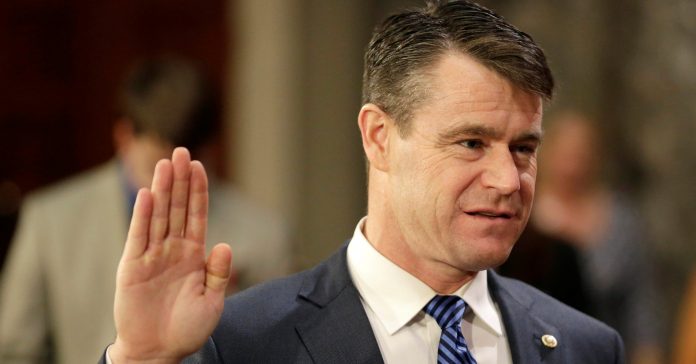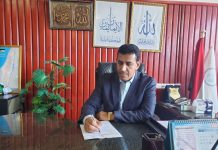
Al-Thawra Net
A U.S.-backed coalition led by the Saudis is impeding the delivery of cranes for a key port in Yemen.
Sen. Todd Young (R-Ind.) on Wednesday indicated that he’s willing to prevent the Senate from confirming a key Trump administration pick until the State Department determines whether Saudi Arabia ― a longtime U.S. partner especially close to President Donald Trump ― is violating American law by hindering relief efforts in Yemen.
At issue is a major naval blockade preventing the delivery to Yemen of U.S. assistance like cranes for unloading cargo ships of food and aid for millions of starving people caught in a years-long civil war.
Seeking clarity on the matter, Young signaled Wednesday that he’s prepared to hold up the confirmation of Jennifer Newstead, the Trump administration’s pick to be the top lawyer at State.
Young’s move is the latest step in an effort to hold the Saudi-led coalition fighting on one side of the Yemeni war accountable for its devastating impact on the country, and its role in what United Nations experts call “widespread violations” of international humanitarian law.
The senator announced his decision during a Senate Foreign Relations Committee hearing for Newstead, a former Justice Department and George W. Bush White House official, on Wednesday afternoon.
After noting that the situation in Yemen is the world’s largest humanitarian crisis, Young asked Newstead whether she or the State Department believe the Saudis’ current policies there ― particularly the naval blockade ― constitute a hindrance to U.S. humanitarian assistance.
Newstead said she would need more time and information to offer a legal opinion, but agreed with Young that the State Department should provide more information on its assessment.
“I for one am going to need clear and unambiguous responses to these questions from you and from the department before we vote on your confirmation on the floor,” Young said.
Senators are allowed to place an official hold on administration appointees over matters of concern. Young has not taken that step yet, but he strongly hinted that he is willing to do so ― and his public conditions for Newstead moving forward have already complicated what would otherwise have likely been a straightforward process, given her credentials.
In a second round of questioning, Young noted that the State Department took three months to respond to his staff’s query about whether the Saudis’ handling of the U.S.-bought cranes violated international humanitarian law. Once the department finally responded, all it said was that it could not provide an opinion.
Young’s move marks the first time an administration nominee’s future has been endangered by the congressional debate over U.S. support for the campaign by Saudi Arabia and the United Arab Emirates in Yemen. Young’s use of the tactic highlights a paradox within U.S. policy: America is a major source of humanitarian aid for Yemen, but it is also providing weapons, aerial refueling and intelligence that help the Saudi-led coalition continue fighting there.
It’s also a sign that frustration over this policy, pioneered by President Barack Obama and continued by Trump, remains strong on Capitol Hill across party lines. Three other Republicans voted with Young against a weapons shipment to Saudi Arabia earlier this year, and two Republicans are involved in an ongoing push to force a House vote on ending U.S. assistance for the Saudi-led coalition. That vote is expected in early November.
Human rights activists and antiwar groups have praised lawmakers’ increasingly visible support for their campaign against the war.
“Section 620i of the US Foreign Assistance Act prohibits the United States from providing assistance to a country that is blocking US-funded humanitarian assistance, unless the President provides Congress with a determination that such a provision is essential for US national security interests,” Gould continued. “From the members and staffers I’ve talked to, they have not received any such determination.”
A Reuters investigation published last week found that the Saudi-led coalition is blocking ships carrying essential supplies from entering Yemen even in cases where those vehicles have been shown to hold no weapons.
“It’s time for the US to follow its own laws, and hold Saudi Arabia accountable,” Gould wrote. “The Saudi dictatorship is using hunger as a weapon of war, and it’s time for the US to stop aiding and abetting Saudi’s deliberate war strategy of reducing millions of Yemeni men, women and children to cholera stricken, emaciated dead bodies.”



















